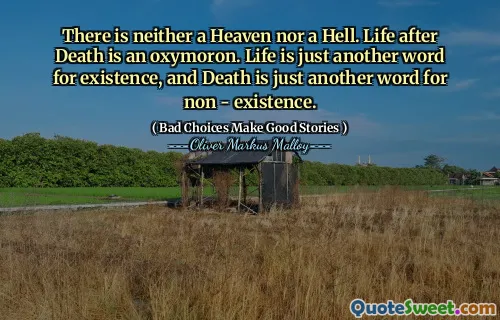
There is neither a Heaven nor a Hell. Life after Death is an oxymoron. Life is just another word for existence, and Death is just another word for non - existence.
This quote challenges traditional notions of the afterlife, denying the existence of Heaven and Hell and dismissing the concept of life after death as contradictory. At its core, it presents a stark, materialistic interpretation of existence: life is framed merely as a state of being, while death is defined as the cessation of that state. By labeling life and death as mere synonyms for existence and non-existence respectively, the statement strips away supernatural constructs, urging readers to confront the reality of life's impermanence. This invites deep reflection on how we perceive meaning, purpose, and legacy.
Such a concept may unsettle those who find comfort in spiritual beliefs about an afterlife, but it also challenges individuals to find significance within the finite span of their earthly experiences. The absence of an afterlife framework could, paradoxically, be liberating: it prompts a heightened appreciation for the present moment, encouraging us to invest authentically in our relationships, passions, and pursuits. It also stresses the importance of conscientious choices, as our lives might not extend beyond death.
In "Bad Choices Make Good Stories," by Oliver Markus Malloy, this perspective resonates with the notion that the consequences of our actions and the narratives we craft during life hold tangible weight, independent of any spiritual continuation. By emphasizing existence alone, this quote underlines the narrative value of the human journey as it unfolds, emphasizing living fully in the here and now instead of deferring meaning to an afterlife. This stark realism compels us to redefine what makes life meaningful on our own terms.






